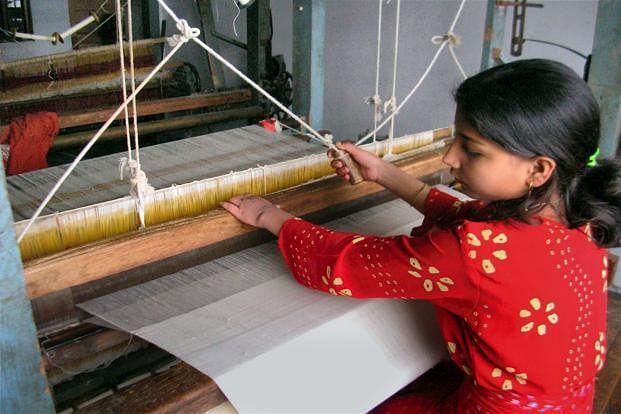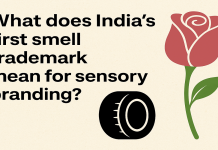This article is written by Sakshi Jain, pursuing a Diploma in Intellectual Property, Media, and Entertainment Laws from LawSikho.
Table of Contents
Introduction
The term ‘Khadi’ is a cultural symbol, the origin of which can be traced back to the Swadeshi Movement, led by Mahatma Gandhi during the independence struggle. Khadi is hand-woven into a natural fibre made with cotton, silk, or woollen yarn. This fibre is sturdy in texture and can be worn comfortably in both summers and winters. With the beginning of the Swadeshi Movement, foreign goods were shunned and Khadi provided an alternative to the British textiles besides providing livelihood to people. People were encouraged to wear it as a symbol of heritage. It has contributed immensely in providing an identity to Indian goods in the international market.
The brand’s zeal to continue being engraved as a cultural symbol and source identifier of products of India has led to a fight of infringement against a trademark application of a German Company named ‘Best Natural Products Gmbh (BNP)’ and has reached the doors of European Union Intellectual Property Office (EUIPO). 
The Khadi and Village Industries Commission Act, 1956
In order to facilitate the establishment of ‘Khadi’ as an Indian brand, an Act named ‘Khadi and Village Industries Commission (KVIC) Act’ was legislated in the year 1956, which gave authority to the Khadi and Village Industries Commission (an autonomous body under the Ministry of Micro, Small, and Medium Enterprises) to control, regulate, and authorize the use of the term ‘Khadi’ on products by holding a trademark registration under most classes. The duty of this commission is to help in the development of Khadi and village industries.
According to Section 2 (d) of the KVIC Act, Khadi is defined as “any cloth woven on handlooms in India from cotton, silk or woolen yarn handspun in India or from a mixture of any two or all of such yarns“, and therefore, it has been used by many textile manufacturers for their handwoven cloth.
In exercise of the powers conferred by Section 27 of the KVIC Act, the Khadi Mark Regulations, 2013 were notified for better regulation of the use of Khadi, according to which, no textile shall be sold as a Khadi product, without bearing a tag from the KVIC. Further, to be eligible for getting such a tag, the product must be purchased from a government-cleared Khadi institution. The main aim behind these regulations was the authentication of genuine Khadi, as defined in the Act.
Khadi and geographical indication
As ‘Khadi’ had acquired a secondary meaning as a handspun fabric of India, various arguments were made to get it recognized as a geographical indication (GI). In the year 2014, the Intellectual Property Rights Association (IPRA) filed an application for recognition of Khadi as a GI. But if such registration was granted, ‘Khadi’ may have been declared to be invalid as a trademark as per Section 25(a) of the Geographical Indication Act. Although the eagerness on the decision of the GI Registry on the fate of the term ‘Khadi’ took an unexpected turn, when IPRA decided to withdraw its application and order on the same was passed in the year 2019.
KVIC’S actions against unauthorised use of ‘Khadi’ tag
Lately, the KVIC has been vigilant in penalising any and every unauthorized use of the ‘Khadi’ mark. One such case came to light in the year 2017, when FabIndia was served a legal notice for using ‘Khadi’ over its products without due authorisation from KVIC. A suit against FabIndia was filed under Section 29 of the Trademarks Act, 1999 on the allegation of resuming illegal use of the ‘Khadi’ tag. As a result, FabIndia withdrew its advertisement campaigns and halted the sale of products under the ‘Khadi’ tag.
KVIC also issued legal notices to Khadi Essentials and Khadi Global for misleading the consumers by using the mark ‘Khadi’ on their products, domain names, and social media handles. Similar actions were taken against unauthorized sale of ‘Khadi Face Masks’ and ‘Khadi PPE Kits’, wherein KVIC issued legal notices to three Delhi-based firms. These instances show the carefulness with which KVIC deals when it comes to any sort of unauthorized use of the Khadi mark.
Khadi v. Khadi before the cancellation division
KVIC has consistently asserted its legal ownership on the mark ‘Khadi’ both at a national and international front. To continue asserting its legal rights over the registered trademark in Khadi, KVIC filed an application in the year 2014 for the cancellation of a Trademark Registration by a German Company named ‘Best Natural Products Gmbh (BNP)’, situated in Munich. BNP’s brand ‘Khadi Naturprodukte’ is in the business of selling various Indian origin products including shampoos, soaps, perfumes, etc. in Europe through online mode. These products are also sold by KVIC in addition to its fabric. The trademark of BNP under the name of ‘Khadi Naturprodukte’ has been registered with the Office for Harmonization of Internal Markets in Belgium.
The KVIC has sought cancellation of the trademark that was given to BNP under Classes 3, 21, and 31 in the United States and European Union. As per information provided by the Minister of Micro, Small, and Medium Enterprises, Mr. Nitin Gadkari, the Commission is also proposing to negotiate the assignment of a trademark registered by BNP in favour of KVIC. To prove its contention, the KVIC and the Government of India had to prove that the product had been selling in the European market under the trademark Khadi for a significant time and various consumers were associated with it. This argument was opposed by the German brand stating that they have created their own brand in 2008 after thorough market research and conclusion that there was no similar trademark present either domestically or internationally. They also said that the Khadi mark was only for a piece of cloth and their trademark application deals with different classes of products altogether.
The Cancelation Division concluded that KVIC was not able to substantiate its argument with relevant documents, resulting in the dismissal of the appeal for invalidity of the trademark. Also, the documentary evidence showed that the KVIC was exporting only to 5 European countries. So, the claim for a well-known mark in the European market was invalid as it was not able to fulfill the requirement under Article 8(4) of the European Trademark Regulation Act. KVIC claimed that there are absolute grounds of invalidity present due to deceptiveness which is against the public interest.
The Cancelation Division said that Khadi is not a part of the common knowledge of the people in the European Union and there were no expectations from the product that was labeled as Khadi. Also, the products concerned are not associated with textiles, so the argument against deception does not hold. Since there was no identical characteristic or similarity in the products, no bad faith can be proved. The dishonest intention cannot be proved on mere prior knowledge of the use of the word Khadi in the Indian market as the European Trademark holder did not know about the permission requirements that were imposed on the use of the word Khadi. KVIC failed to prove that Khadi had a reputation in the European Union and the German company has taken advantage of that acquired reputation. Thus, the Cancelation Division of the EUIPO dismissed the application for cancelation.
This decision of the cancelation division was upheld by the Boards of Appeal in 2017. The German General Court also confirmed the order in 2018. After these orders, the KVIC had filed an application for registration in WIPO and EUIPO which are pending before the office. The motive behind these applications is to establish an Indian brand internationally and stop it from getting diluted. This solution can also be termed as preventive of bio-piracy and was earlier seen in the cases of turmeric and neem where the multinational corporations have tried to patent them.
Bio-piracy of Indian traditional knowledge
Indian traditional knowledge is more susceptible to bio-piracy as due to language constraints, patent offices have difficulty in tracing the prior art. These traditional practices are reliable because they have been used for centuries and the absence of prior art makes it easy for corporations to get patents on these.
The government under the Ministry of Micro, Small and Medium enterprises have taken various initiatives to make Khadi recognisable in the international market they have decided to ensure that Khadi product is genuine by attaching a Khadi mark to it. It has also given Khadi and Village Industries Commission status of deemed Export Promotion Council (EPC) and 1088 Khadi institutions have taken membership to enter the export business. The government plans to arrange a tie-up with foreign institutions like the Federation of Indian Export Organisation, World Trade Centre, Indian Trade Promotion Organisation, Trade Promotion Council of India, etc. This will help in establishing healthy business opportunities and gaining access to sellers and buyers in the international market by ways of organising exhibitions, workshops, trade fairs, etc. on foreign soil.
Conclusion
The determination of the class of the products will be a key in the registration of the Khadi trademark. It would be easier to prove infringement if the application was also for fabric. Another way to prove infringement will be to establish that there was a dilution of the mark. The unfair practice of dilution not only leads to a reduction in the value of the product but also diminishes the commercial value of a registered trademark.
The hallmark of the Khadi and Village Industries Commission is labour intensiveness and it provides livelihood to the artisans associated with the craft. The international registration of the Khadi trademark will also help in generating income in the form of royalties which would be paid when the trademark is used by the foreign companies. This would neutralise the threat to the livelihood of the craftsmen and the reputation associated with the specious good.
References
- Khadi and Village Industries Commission v European Union Intellectual Property Office (EUIPO), T-682/17
- https://economictimes.indiatimes.com/industry/cons-products/garments-/-textiles/kvic-seeks-international-trademark-for-khadi-items/articleshow/73507291.cms?from=mdr
- https://spicyip.com/2014/11/trademark-battle-over-khadi.html
Students of LawSikho courses regularly produce writing assignments and work on practical exercises as a part of their coursework and develop themselves in real-life practical skills.
LawSikho has created a telegram group for exchanging legal knowledge, referrals, and various opportunities. You can click on this link and join:
 Serato DJ Crack 2025Serato DJ PRO Crack
Serato DJ Crack 2025Serato DJ PRO Crack










 Allow notifications
Allow notifications


